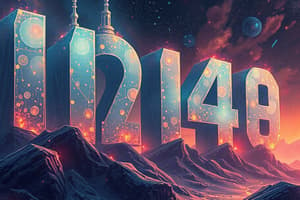Podcast
Questions and Answers
What is the correct written form of the number 1,003,456?
What is the correct written form of the number 1,003,456?
- One million three hundred four thousand five hundred sixty-six
- One million three hundred four thousand five hundred sixty-seven (correct)
- One million thirty-four thousand five hundred sixty-seven
- One million three thousand four hundred fifty-six
The ordinal number for 15 is fifteenth.
The ordinal number for 15 is fifteenth.
True (A)
Write the number 76 in words.
Write the number 76 in words.
seventy-six
The number 100 is written as _____ in words.
The number 100 is written as _____ in words.
Match the following ordinal numbers with their correct numeric forms:
Match the following ordinal numbers with their correct numeric forms:
Flashcards are hidden until you start studying
Study Notes
Composing Large Numbers
- Break down large numbers into manageable parts.
- Use place value to read and write:
- Thousands (1,000)
- Millions (1,000,000)
- Billions (1,000,000,000)
- Write out each part and combine:
- Example: 1,234,567 is "one million two hundred thirty-four thousand five hundred sixty-seven."
Ordinal Numbers
- Indicate position or order in a sequence.
- Formed by adding suffixes:
- First (1st)
- Second (2nd)
- Third (3rd)
- For numbers 4 and above, use:
- Fourth (4th)
- Fifth (5th)
- Sixth (6th), and so on.
- Larger ordinal numbers follow a similar pattern:
- 21st (twenty-first), 22nd (twenty-second), 23rd (twenty-third), etc.
Numbers Till Hundreds
- Write numbers from 1 to 100 in words:
- 1-10: one, two, three, four, five, six, seven, eight, nine, ten
- 11-19: eleven, twelve, thirteen, fourteen, fifteen, sixteen, seventeen, eighteen, nineteen
- 20-90: twenty, thirty, forty, fifty, sixty, seventy, eighty, ninety
- Combine tens and units for numbers 21-99:
- Example: 42 is "forty-two," 76 is "seventy-six."
- Special case for "hundred":
- 100 is "one hundred."
Composing Large Numbers
- Large numbers can be simplified by breaking them into sections based on place value.
- Place values include:
- Thousands, represented by 1,000.
- Millions, represented by 1,000,000.
- Billions, represented by 1,000,000,000.
- To articulate large numbers, express each component separately before combining:
- Example: 1,234,567 reads as "one million two hundred thirty-four thousand five hundred sixty-seven."
Ordinal Numbers
- Ordinal numbers specify the position of an item in a list or sequence.
- Formed by adding appropriate suffixes to cardinal numbers:
- 1 becomes "first" (1st)
- 2 becomes "second" (2nd)
- 3 becomes "third" (3rd).
- For numbers four and higher, the pattern continues with:
- Fourth (4th), Fifth (5th), Sixth (6th), etc.
- Larger ordinal numbers follow a consistent method:
- 21st is "twenty-first," 22nd is "twenty-second," and 23rd is "twenty-third."
Numbers Till Hundreds
- Numbers between 1 and 100 should be written in words for clarity:
- Basic numbers from 1-10: one through ten.
- Numbers from 11-19 have unique names: eleven through nineteen.
- Multiples of ten from 20-90 are: twenty, thirty, forty, fifty, sixty, seventy, eighty, ninety.
- For numbers 21-99, combine tens and units with a hyphen:
- Example: "forty-two" for 42 and "seventy-six" for 76.
- The word "hundred" is special, with 100 written as "one hundred."
Studying That Suits You
Use AI to generate personalized quizzes and flashcards to suit your learning preferences.




